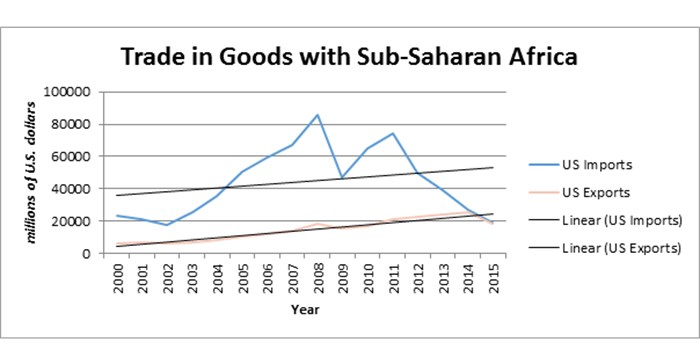The effect the recent rise in populist sentiment globally will have on the African market remains to be seen. In the run-up to the US presidential election, both Hillary Clinton and Donald Trump offered economic proposals that would have a possible long-term impact on African trade with the United States. Then there is the prospect of a 'Hard Brexit' and its possible implications on trade with Sub-Saharan Africa.
A continual theme throughout the Republican nominee, Donald Trump’s campaign has been that the United States had entered into numerous trade agreements which he feels are unfavourable. Democrat rival, Hillary Clinton, has argued to rather intensify the enforcement of trade laws by creating a chief trade prosecutor and by tripling the number of trade enforcement officers.
Whether the newly elected President sticks to their promise remains to be seen. However, it is likely that African countries will face further out-of-cycle reviews of AGOA.
The Africa Growth and Opportunity Act with over 40 eligible Sub-Sahara African countries has been a boon to the region. According to the report titled Beyond AGOA from the Office of the US Trade Representative, non-oil total goods trade has grown from $13 billion a year to nearly $30 billion since AGOA was enacted.
That increased out-of-cycle reviews will be likely has been further evidenced by the July 2015 out-of-cycle review regarding South Africa’s eligibility and Burundi’s ejection due to crackdowns in the country on political opposition. The threat of an out-of-cycle review with Sub-Saharan Africa’s leading country South Africa has again resurfaced with the South African Poultry Association (SAPA) and South African Pork Producers Organisation (SAPPO) looking to obtain a court injunction to block US chicken imports.
Lesotho’s inclusion is likely to face scrutiny as a result of the on-going political crises facing the country. Lesotho has to an extent been one of the largest beneficiaries of AGOA with around 80% of their textile and garment exports going to the US.
‘Hard Brexit’
The prospect of a ‘Hard Brexit’ by the United Kingdom could cause considerable uncertainty for a number of Sub-Saharan countries. The oft-quoted term ‘Hard-Brexit’ denotes the United Kingdom severing all links with EU institutions, pulling out of the single market and curbing EU immigration. It’s unclear what the full effect this will have on Sub-Saharan Africa however the effect is likely to be largely negative with trade agreements such as EU-SADC Economic Partnership Agreement (EPA) becoming void.
Renegotiating terms for an agreement could take years. However this is likely to be fast-tracked should this scenario come to fruition, given the significant exposure African export markets have to the United Kingdom with the largest exposure lying in South Africa. Countries will be inclined to negotiate new trade deals with the UK within the framework of the various regional blocs, increasing their leverage in negotiations and speeding up the process.
The increased populist sentiment is expected to have longer term effects on Sub-Saharan Africa’s relationship with the world. Nevertheless, in the short term these moves are expected to reduce capital flows into the higher risk Sub-Sahara African region with jittery investors looking to safer markets for generating returns. There is however a silver-lining to the rise of populist sentiment in the form of increased opposition to austerity. Of late, there have been numerous pronouncements regarding the reintroduction of fiscal stimulus measures.
In the run-up to the election, the newly elected US president has pledged to make use of various infrastructure spend initiatives. Japan has announced a 28.1 trillion yen stimulus programme, Canada has also announced a further increase of 60 billion Canadian dollars in new infrastructure spend and China has also released their 1.6 trillion yuan Northeast Revitalisation Plan 2.0. These will optimistically have the effect of boosting demand for Sub-Saharan African commodity exports, increasing commodity prices and leading to increased levels of growth in Sub-Saharan Africa.


























